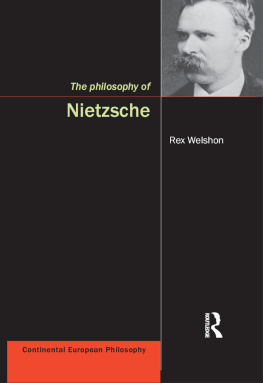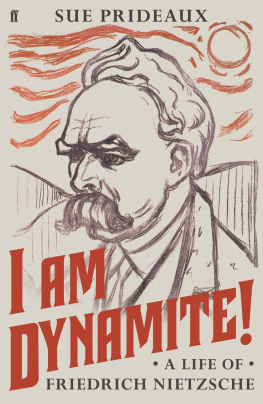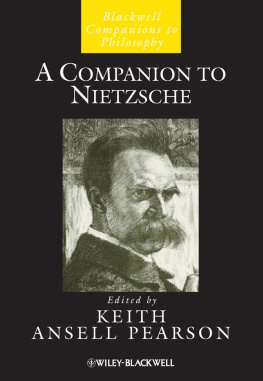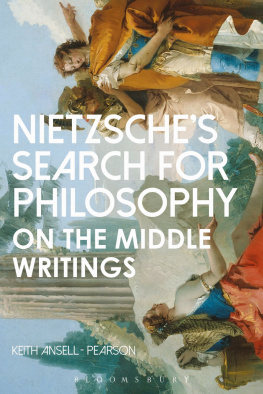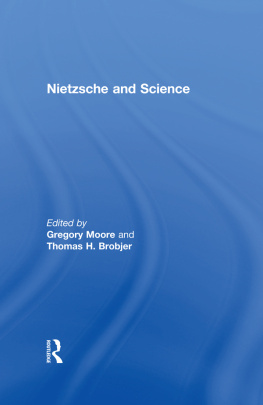
The Philosophy of Nietzsche
Continental European Philosophy
This series provides accessible and stimulating introductions to the ideas of continental thinkers who have shaped the fundamentals of European philosophical thought. Powerful and radical, the ideas of these philosophers have often been contested, but they remain key to understanding current philosophical thinking as well as the current direction of disciplines such as political science, literary theory, comparative literature, art history, and cultural studies. Each book seeks to combine clarity with depth, introducing fresh insights and wider perspectives while also providing a comprehensive survey of each thinkers philosophical ideas.
Published titles
The Philosophy of Gadamer
Jean Grondin
The Philosophy of Merleau-Ponty
Eric Matthews
The Philosophy of Nietzsche
Rex Welshon
Forthcoming titles include
The Philosophy of Deleuze
Peter Sedgwick
The Philosophy of Derrida
Mark Dooley
The Philosophy of Habermas
Andrew Edgar
The Philosophy of Hegel
Allen Speight
The Philosophy of Heidegger
Jeff Malpas
The Philosophy of Husserl
Burt Hopkins
The Philosophy of Kant
Jim OShea
The Philosophy of Kierkegaard
George Pattison
The Philosophy of Marx
Mark Neocleous
The Philosophy of Rousseau
Patrick Riley, Sr and Patrick Riley, Jr
The Philosophy of Sartre
Anthony Hatzimoysis
The Philosophy of Schopenhauer
Dale Jacquette
The Philosophy of Nietzsche
Rex Welshon

First Published 2004 by Acumen
Published 2014 by Routledge
2 Park Square, Milton Park, Abingdon, Oxon OX14 4RN
711 Third Avenue, New York, NY 10017, USA
Routledge is an imprint of the Taylor and Francis Group, an informa business
Rex Welshon, 2004
This book is copyright under the Berne Convention.
No reproduction without permission.
All rights reserved. No part of this book may be reprinted or reproduced or utilised in any form or by any electronic, mechanical, or other means, now known or hereafter invented, including photocopying and recording, or in any information storage or retrieval system, without permission in writing from the publishers.
Notices
Practitioners and researchers must always rely on their own experience and knowledge in evaluating and using any information, methods, compounds, or experiments described herein. In using such information or methods they should be mindful of their own safety and the safety of others, including parties for whom they have a professional responsibility.
To the fullest extent of the law, neither the Publisher nor the authors, contributors, or editors, assume any liability for any injury and/or damage to persons or property as a matter of products liability, negligence or otherwise, or from any use or operation of any methods, products, instructions, or ideas contained in the material herein.
ISBN 13 : 978-1-902683-89-7 (hbk)
ISBN 13 : 978-1-902683-90-0 (pbk)
British Library Cataloguing-in-Publication Data
A catalogue record for this book is available from the British Library
Designed and typeset in Classical Garamond
by Kate Williams, Swansea.
For my parents, Donald and Eleanor,
and my brothers, Douglas and Lawrence
Contents
Acknowledgements
I would like to thank the following people for direct and indirect help in this project: Frederic Bender, Perrin Cunningham, Steve Hales, Bernard Reginster, Richard Schacht and Christopher Shields. I would like to thank the Department of Philosophy at the University of Colorado at Colorado Springs and the Office of the Dean of the College of Letters, Arts, and Sciences at the University of Colorado at Colorado Springs, Linda Nolan, Dean, for their support. I would also like to thank series editor John Shand, and Steven Gerrard at Acumen, for their patience, and Kate Williams for her judicious copy-editing.
Abbreviations
I use the following abbreviations for in-text citations to Nietzsches works. Full bibliographical information for Nietzsches works, including those not cited in the text, is supplied in the Guide to Further Reading.
AC | The Anti-Christ: Curse on Christianity |
BGE | Beyond Good and Evil: Prelude to a Philosophy of the Future |
BT | Birth of Tragedy |
D | Daybreak: Reflections on Moral Prejudices |
EH | Ecce Homo: How One Becomes What One Is |
GM | On the Genealogy of Morals: A Polemic |
GS | The Gay Science |
HAH | Human, All Too Human: A Book for Free Spirits |
TI | Twilight of the Idols, or How One Philosophizes with a Hammer |
UM | Untimely Meditations |
WP | The Will to Power |
References to specific passages follow International Studies in Philosophy style. For example, BGE 230 refers to Beyond Good and Evil, section 230 and TI III 1 refers to Twilight of the Idols, , section 1. All emphasis in extracts is Nietzsches, unless otherwise indicated.
The Will to Power is a degenerate book. Edited by Nietzsches sister, Elisabeth, from unpublished notes she found in Nietzsches possession, The Will to Power is less a book by Nietzsche than a collection of Elisabeths favourite passages from his notebooks. The notebooks Nietzsches Nachlass are arranged chronologically. In this book I sometimes use the Nachlass notes that appear in The Will to Power. They are identified as Nachlass notes with references to The Will to Power.
Introduction
Reading and writing about Nietzsche
Friedrich Nietzsche (18441900) is the worlds most controversial philosopher. He is also the worlds most relentlessly interesting philosopher. There is no other philosopher who writes as beautifully about as many topics as does Nietzsche, and no other philosopher whose ideas are more notorious. For all his notoriety, however, Nietzsche is increasingly remembered for his trenchant criticisms of the Western philosophical and theological traditions, for his celebration of creativity and flourishing, and for his tireless campaign to replace woolly-minded metaphysics with a philosophical view that is naturalistic and closely aligned with science. This change is welcome. For a century, Nietzsche has reigned as the one philosopher whose work should perhaps be banned, the one philosopher the mere mention of whose name is likely to raise the hackles on most of those within earshot. We shall, in due course, uncover the reasons why Nietzsche has this effect on otherwise reasonable people. In the vast majority of cases his villainous reputation is not deserved, and in the one case where it is deserved his scathing criticism of Christianity his reputation misleads by focusing attention away from the substance of his concerns, which have, in some cases, been raised by Christians themselves.
Next page
